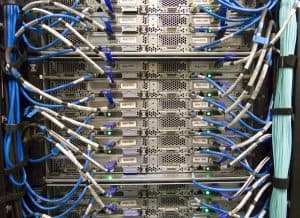What is a data centre and why care? Why is it important to understand the options? What is the relationship between a data centre, business growth and margins?
In a mad rush, we cut the power
There was a moment of stunned shock as water gushed from the ceiling. Someone shouted “computers” and it suddenly dawned, water was pouring over the machines. In a mad rush, we cut the power, pulled out cables as fast as we could, lifting the kit to safety.

We were in a serviced office and a pipe burst. What were the chances? We’d had concerns before, but nothing like that. A couple of years before we’d had our machines in an office at the bottom of someone’s garden when outside temperatures soared into the thirties. The office temperature had risen to a melting mid-forties!
Although we had back-ups, losing kit would have been disruptive. Imagine the delay in getting replacement kit, installing software, configuration and getting it all running correctly. Late or delayed projects can impact cash flow and customer confidence, not to mention cause stress.
We all use cloud now, don’t we?

Of course, if you’re using cloud, you’re using a data centre. Start-ups use cloud applications because they’re cost effective. Don’t we all use cloud now? Do people still run their office systems in a computer under the desk or in cupboard in the corner? Well yes, they do for a variety of reasons. That might be for a specific piece of software, something custom, or keeping data in-house.
What is a data centre?
Data centres tend to have a low profile. When you drive up to the gates you might wonder if you’ve come to the right place. Chances are security are watching you on CCTV and systems are recording your number plate. You might notice high anti scale fences and razor wire. Security might involve retina scans or other biometrics. Once through the front-desk security, zoned security only allows access to what you need and no more.
There are several data halls filled with racks of computers. As you enter, you’ll notice the noise of all the computers with their whining cooling fans. You’ll feel the draft of cold filtered air pumped into the hall like a wind tunnel.

Shared data halls might have individually locked racks to protect your computers. When you open the rack door you might notice two power supplies and more than one network cable per machine. You get a glimpse of the data centre design. It’s designed to keep systems running even when things fail.
We’re fortunate in the UK to have a reliable infrastructure. Yet we can probably all recall a time we’ve lost power or internet. A cable accidentally cut during road works, a fire or flood. If you walk around the outside of a data centre, you’ll see two separate high-voltage transformers to step down the power from two sources. Two sets of diesel generators. Two sets of cooling systems. Inside you’ll find two halls of full of batteries used to keep everything going until the generators start.
When it makes sense

It’s not a case of if there will be a failure, it’s more a case of when. As a business scales it has more customers and more staff. The cost and impact of computer system failure increases. Critical services may need to run to avoid damage to the business. If staff are powerless to serve customers for a whole week or more, how would that impact a growing business? Could that impact revenue, profit, market share or even going into a new market? Something will fail, that’s for sure. Why use a data centre, couldn’t you have something simpler in house? Well, yes and no. It’s all about the level of risk. The business decides what level of impact is acceptable. Data centres are a powerful tool in the infrastructure armoury.
Economy of scale
You could invest in your own data centre. Large business certainly own data centres. As we’ve seen it’s a big investment and out of the reach of most scaling businesses. Reducing risk of failure has a cost: the building, security, staff, equipment, transformers, generators, cooling systems, networks, cables not to mention many suppliers. Having a bit of a data centre makes commercial sense because of economy of scale.
Environment
It’s not only economy of scale, it can also be more efficient and better for the environment. A non-profit organisation, the Green Grid, introduced Power Usage Effectiveness (PUE). This allows businesses to compare data centre efficiency. It’s the ratio between the power used by the computers and total power. For example, a PUE of 1.2 would mean that the data centre uses 20% more power to run the data centre than the computers.
As power is the biggest cost, having a green PUE of 1.2 would result in a lower operating cost for the data centre. That’s likely reflected in better prices for customers. A win for the environment and the bank balance.
So how can a data centre be more efficient? Smarter data centres will extract the heated air from a gulley to reduce heat build-up and the need for extra chilled air. Instead of using refrigeration units for cooling, they might use a system like a car radiator.
Finally
Scaling businesses requires planning and thought to improve performance and reduce disruption. Cloud services and data centres provide valuable infrastructure to help a business scale. Choosing the right time and the right option involves understanding the business needs, plans and risks.
Many struggle with getting the best of out of technology. Our guide, Business Technology: Essential Guide to Best Use, will help you create a robust process to ensure your new tech achieves your aims.
Related Articles
If you’d like to explore the ideas in this article further or need help and advice, please contact Rogan at rhounsell@kr5consulting.com – to arrange an informal chat.
If you’ve found this blog interesting or useful, please ‘like’, ‘comment’ or ‘share’ so it can help others too.

